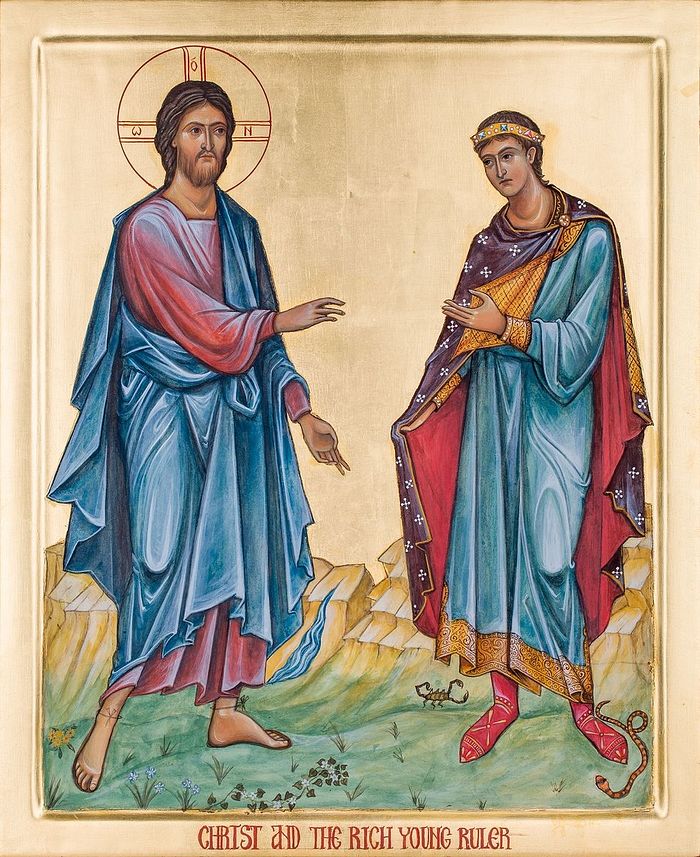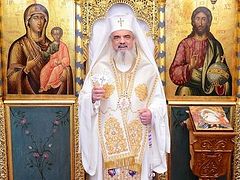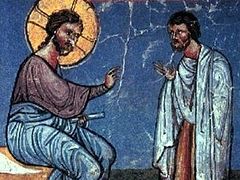In the name of the Father, and of the Son, and of the Holy Spirit!
If thou wouldest enter into life, keep the commandments. We hear these words in the Gospel of Matthew’s version of the story we read from the Gospel of Luke today. The Sacred Scriptures of the New Testament repeatedly and in various ways speak of the necessity of fulfilling the commandments, as an indispensable condition for achieving communion with the Lord and blessedness in both the present and future life.
Today’s Gospel narrative tells us about how one noble man, called a ruler, came to the Lord, tempting Him, inquiring as to what he should do to inherit eternal life. He called the Lord good. But the Lord knows that this man does not consider Him good, and therefore the Lord said to him: Why callest thou me good? none is good, save one, that is, God, but if you want to inherit eternal life, then observe the commandments: Do not commit adultery, Do not kill, Do not steal, Do not bear false witness, Honour thy father and thy mother. And he answered the Lord that he has kept all these things from his youth. Then the Lord looked at him and said: Yet lackest thou one thing: sell all that thou hast, and distribute unto the poor, and thou shalt have treasure in Heaven: and come, follow Me.
But hearing such an instruction from the Lord, this man was indignant in spirit, because he was rich and it was unbearable for him. Therefore, the Lord said to those around him: How hardly shall they that have riches enter into the Kingdom of God! For it is easier for a camel to go through a needle's eye, than for a rich man to enter into the Kingdom of God. Then those around the Lord asked, Who then can be saved? And the Lord answered: The things which are impossible with men are possible with God.
This Gospel narrative tells us about the necessity of keeping the commandments for achieving blessedness in the present life as far as possible, because such blessedness is revealed in its fullness only in the life of the future age. But in order to achieve eternal life, we have to keep the commandments, keep the holy will of God, which is for every man to strive to fulfill those commandments, those covenants left to us by the Lord Himself, so that by fulfilling them we would be morally perfected. These aren’t just some prescriptions having no relation to the moral life of man, but on the contrary, the commandments are those commands by which we achieve moral perfection in carrying them out.
And we know that in this regard, we need to keep the commandments of the Old Testament, because these commandments were given to us by the Lord Himself through the Prophet Moses. The Lord reminded us today, giving instruction to this noble man, that we must keep these commandments, because they are an eternal law. Although this man who inquired of the Lord and who was grieved when he heard the instruction to sell what he had and distribute it to the poor said he observed the commandments of which the Lord reminded him, apparently he did not keep them as they were meant to be fulfilled, because it’s important not only to perform some external acts of virtue, but it is required to perform them with the appropriate spiritual disposition.
St. Basil the Great says a person can fulfill the will of God, the Lord’s commandments, from different motivations: out of fear of punishment, from a desire to receive a reward for the fulfillment of the commandments, or out of love. Thus, there are three states or motivations that can guide every man in his life. But, of course, fulfilling the commandments out of fear is the lowest level. St. Basil the Great calls this a state of slavery. A slave fears his master, fears being punished for violating his orders, and therefore he tries, on the one hand, not to break them, and on the other hand, to execute the command.
The second state is mercenariousness, because a mercenary expects a reward for fulfilling the commandments; he doesn’t take care for his inner disposition, but he knows that if he fulfills it, he will receive the corresponding reward. Therefore, St. Basil the Great calls this state mercenariousness.
The third state is that of sonship, because a son fulfills commands out of love for his father. It is love that should ever be at the foundation of human behavior, because the Lord Himself said that love is the virtue upon which hang the Law and prophets. And, indeed, this is the main commandment, which, although it was proclaimed already in the Old Testament, the Lord Himself revealed the fullness of its meaning and significance, because He demonstrated sacrificial love. As the Lord Himself says: For God so loved the world that He gave His only-begotten Son, that whosoever believeth in Him should not be perish, but have everlasting life. Thanks to this sacrificial love, the Lord accomplished the atonement of all of mankind, and, therefore, this third state, the state of sonship, when a man commits good deeds only out of love, is precisely that which is required from a true believer in Christ.
St. Basil the Great says that a virtue performed under compulsion cannot be considered a virtue. Virtue is a state of the free will of man, that is, when man’s free will induces him to commit this or that good deed. St. Basil the Great also says that when we speak about the need to fulfill the virtues out of love, we must strive to fulfill all the virtues. If someone is sick with many diseases and has been able to get rid of all of them but one, it’s of little use to him, because this remaining sickness, this malady can lead to his death. Therefore, if someone fulfills all the virtues but one, then (inasmuch as the virtue is the opposite of the corresponding vice) that vice, which is opposite to the virtue, possesses the man. And therefore, in the end, he can fall rather than climb the path of moral perfection.
That is why, dear brothers and sisters, giving heed to what is said in the Gospel, as the Holy Fathers instruct us on how we should live, how to act, we must strive to truly ascend the moral ladder of perfection, not stopping at the fulfilment of virtues out of fear or the hope of reward, but only out of a sincere feeling of love—because love is that perfect state to which the Lord calls us, and the Holy Fathers tell us that love is the height and crown of virtues. The holy apostle Paul also says that faith and hope will cease in the life of the future age, but love will never cease, because it is what passes into eternal life.
Therefore, dear brothers and sisters, let us strive to acquire true, genuine, sacrificial love, and then the Lord will help us fulfill our calling. Of course, fulfilling the commandments is a difficult matter, and the path to salvation is not easy. But the Lord Himself, to the bewilderment of those around Him (who asked: Who then can be saved?), said that it is impossible for man, but for God everything is possible. If the Lord gives us commandments, then He also gives us the Divine grace that helps us fulfill those commands. Let us sincerely strive to arm ourselves against vice with the help of this Divine strength, and make an effort to acquire the virtues. And the Lord, by His immeasurable goodness, will grant us the unspeakable blessings prepared for those who love Him.




